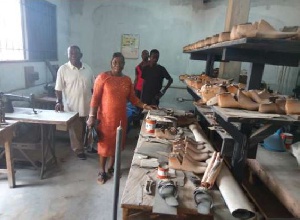 The company needs leather to resume operation effectively
The company needs leather to resume operation effectively
Akuley Shoe Factory, one of Ghana’s indigenous and biggest shoe factories is in dire need of financial support to come back to life.
The factory, known for its quality Adidas football boots, bags, and general shoe and leather works in the 1970s folded up in 2008 due to financial stress and now a pale shadow of itself.
This came to light when the Volta Regional executives of the Ghana Journalists Association (GJA) visited the factory in Kpando as part of activities aimed at helping revive viable but distressed local industries.
Mr. John Kwabena Akuley, the Chief Executive of the factory told the Ghana News Agency that Adidas, a German multinational manufacturers of shoes, clothing and accessories gave him the patent to make their products for the Ghanaian local market after his training at Pirmasens and work experience at the Deutsche Shoe Factory, all in Germany but inadequate working capital affected their operations.
He said after the company relocated to Kpando in 1991 from Tema, it concentrated more on the manufacturing of shoes, sandals, sports and laptop bags and employed a good number of young people but could not sustain the business.
Consequently, heavy shoemaking machines including cutting, folding, spraying, branding, sewing, finishing and polishing machines were left to rot at the company’s well secured site in the central business district of Kpando.
Mr. Akuley said what the company needed was leather to resume operation.
Mr. Dela Gadzanku, Volta/Eastern Chairman, Association of Ghana Industries (AGI) said the Association was working to get some funds for such distress industries.
Mr. Elvis Gyampo, the Municipal Chief Executive of Kpando said the current state of the company was a headache for the Assembly and that they were working on attracting investors and “strategic partners” to help revive the factory.
In a related development, the Volta GJA executives also visited the Volta Star Textiles Ghana Limited and learnt that the company was producing under 40 per cent of its capacity, also due to financial stress and was unable to get a stimulus package it applied for last year to revive its operations.
Management of the company however said an investor was revaluing operations of the facility towards its revival.
Volta Star Textiles has the biggest spinning and weaving capacity in the country with an estimated grey cloth output of 26 million yards with its current cloth construction of 960 tappet looms.
The average loom speed is 160 rpm with ring spinning capacity of 35,000 spindles and a spindle speed of 11,000 rpm.
The company was liquidated in 2005 but government revived it in 2007 and changed the name from Juapong Textiles to Volta Star Textiles.
The management, in a five-year business strategy said it needed GH?20 million to turn the fortunes of the company around.